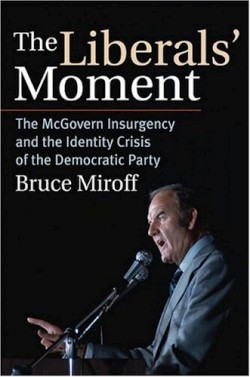The Liberals' Moment
The McGovern Insurgency and the Identity Crisis of the Democratic Party
The 1972 presidential election, a landslide but short-lived victory for President Richard Nixon, was a crushing loss for Democratic standard-bearer George McGovern and for his party. James O’Hara, the Democratic convention parliamentarian, remembers this disastrous campaign as a time when “the American people made association between McGovern and gay lib, and welfare rights, and pot-smoking…and everything else they saw as threatening their value system.” No history of the campaign has been written since the early 1970s, and the author fills this void in his excellent investigation of the election and its legacy.
Miroff, professor of political science and Collins Fellow at the State University of New York-Albany, is the author of several highly regarded books, including Icons of Democracy: American Leaders as Heroes, Aristocrats, Dissenters, and Democrats and the co-author of The Democratic Debate: An Introduction to American Politics. The author views McGovern sympathetically but critically, and devotes much of the book to describing McGovern’s campaign flaws.
A notable strength of Miroff is his descriptions of the mass movements—antiwar, women, gay, and African-American—that supported McGovern and ensured his nomination as Democratic presidential candidate, but also contributed to his defeat in the general election. A number of misconceptions about the McGovern campaign are revealed, including Nixon’s unpopularity and the strength of McGovern’s support among young voters. Actually, Nixon was at the height of his popularity, following his trip to China, and he had almost as much support among the young as McGovern.
Much of McGovern’s support came from those who earned their political stripes in the antiwar and civil rights movements and in the 1968 presidential campaigns of Eugene McCarthy and Robert Kennedy. To Nixon supporters and to the droves of Democrats who refused to support McGovern, these people were held in contempt for wanting to turn America over to the candidate “of the 3 A’s: acid, amnesty, and abortion.” This charge, leveled by Republican Senator Hugh Scott, has been used successfully, in a variety of forms, against all Democratic presidential candidates since 1972.
The legacies of the 1972 election continue to bedevil the Democrats. Notably, the defection of blue collar and ethnic voters to the Republican Party, the loss of the one-time solid Democratic South, sustained vilification of liberals by conservatives, and the beginning of the neo-conservative movement. The author concludes that if the Democrats are to regain the presidency they must reconnect the public with their historical traditions of economic and social fairness, more effectively than McGovern did in his doomed quest for the presidency.
Reviewed by
Karl Helicher
Disclosure: This article is not an endorsement, but a review. The publisher of this book provided free copies of the book to have their book reviewed by a professional reviewer. No fee was paid by the publisher for this review. Foreword Reviews only recommends books that we love. Foreword Magazine, Inc. is disclosing this in accordance with the Federal Trade Commission’s 16 CFR, Part 255.

